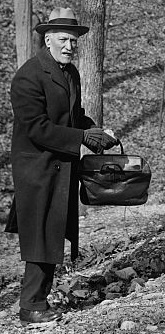Walter Hough on:
[Wikipedia]
[Google]
[Amazon]
Walter Hough, Ph.D. (1859‚Äď1935) was an American
 In 1892, Hough was made Knight of the Order of Isabella when in
In 1892, Hough was made Knight of the Order of Isabella when in
"Censers and incense of Mexico and Central America"
ÄĒfull online copy at
"The First Claim for Cannibalism in the Southwest: Walter Hough's 1901 Discovery at Canyon Butte Ruin 3, Northeastern Arizona"
''American Antiquity'', Vol. 57, No. 4 (Oct., 1992), pp. 661‚Äď682 1859 births 1935 deaths American explorers Smithsonian Institution people American ethnologists {{US-scientist-stub
ethnologist
Ethnology (from the grc-gre, ŠľĒőłőĹőŅŌā, meaning 'nation') is an academic field that compares and analyzes the characteristics of different peoples and the relationships between them (compare cultural, social, or sociocultural anthropology) ...
who worked for the Smithsonian Institution
The Smithsonian Institution ( ), or simply the Smithsonian, is a group of museums and education and research centers, the largest such complex in the world, created by the U.S. government "for the increase and diffusion of knowledge". Founded ...
.
Life
Hough was born atMorgantown, West Virginia
Morgantown is a city in and the county seat of Monongalia County, West Virginia, Monongalia County, West Virginia, United States, situated along the Monongahela River. The largest city in North-Central West Virginia, Morgantown is best known as th ...
. He was educated at Monongalia Academy
Morgantown is a city in and the county seat of Monongalia County, West Virginia, United States, situated along the Monongahela River. The largest city in North-Central West Virginia, Morgantown is best known as the home of West Virginia Universit ...
, West Virginia Agricultural College, and West Virginia University
West Virginia University (WVU) is a public land-grant research university with its main campus in Morgantown, West Virginia. Its other campuses are those of the West Virginia University Institute of Technology in Beckley, Potomac State College ...
(A.B., 1883; Ph.D., 1894). He was employed at the Smithsonian National Museum of Natural History
The National Museum of Natural History is a natural history museum administered by the Smithsonian Institution, located on the National Mall in Washington, D.C., United States. It has free admission and is open 364 days a year. In 2021, with 7. ...
as an assistant (1886‚Äď1894), as assistant curator
A curator (from la, cura, meaning "to take care") is a manager or overseer. When working with cultural organizations, a curator is typically a "collections curator" or an "exhibitions curator", and has multifaceted tasks dependent on the parti ...
of ethnology (1896‚Äď1910), and as curator from 1910 until his death in 1935. Though Hough's work revolved around cataloging the museum's collections, he also spent time doing archaeological
Archaeology or archeology is the scientific study of human activity through the recovery and analysis of material culture. The archaeological record consists of artifacts, architecture, biofacts or ecofacts, sites, and cultural landscap ...
field work in the American Southwest
The Southwestern United States, also known as the American Southwest or simply the Southwest, is a geographic and cultural region of the United States that generally includes Arizona, New Mexico, and adjacent portions of California, Colorado, N ...
. In 1905, Hough unearthed preserved cobs of maize
Maize ( ; ''Zea mays'' subsp. ''mays'', from es, maíz after tnq, mahiz), also known as corn (North American and Australian English), is a cereal grain first domesticated by indigenous peoples in southern Mexico about 10,000 years ago. Th ...
in a cave in New Mexico
)
, population_demonym = New Mexican ( es, Neomexicano, Neomejicano, Nuevo Mexicano)
, seat = Santa Fe
, LargestCity = Albuquerque
, LargestMetro = Tiguex
, OfficialLang = None
, Languages = English, Spanish ( New Mexican), Navajo, Ker ...
that helped subsequent archaeologists determine that the Mogollon ethnic group inhabited the area before the Anasazi Puebloans, who were previously considered to be the area's earliest inhabitants.
 In 1892, Hough was made Knight of the Order of Isabella when in
In 1892, Hough was made Knight of the Order of Isabella when in Madrid
Madrid ( , ) is the capital and most populous city of Spain. The city has almost 3.4 million inhabitants and a metropolitan area population of approximately 6.7 million. It is the second-largest city in the European Union (EU), and ...
as a member of the United States Commission. He was also a member of Dr. J. Walter Fewkes
Jesse Walter Fewkes (November 14, 1850 ‚Äď May 31, 1930) was an American anthropologist, archaeologist, writer, and naturalist.
Biography
Fewkes was born in Newton, Massachusetts on November 14, 1850, and initially trained as a zoologist at ...
' expedition to Arizona
Arizona ( ; nv, Hoozdo Hahoodzo ; ood, Alń≠ ŠĻ£onak ) is a state in the Southwestern United States. It is the 6th largest and the 14th most populous of the 50 states. Its capital and largest city is Phoenix. Arizona is part of the Fou ...
(1896‚Äď1897).
Publications
"Censers and incense of Mexico and Central America"
ÄĒfull online copy at
HathiTrust
HathiTrust Digital Library is a large-scale collaborative repository of digital content from research libraries including content digitized via Google Books and the Internet Archive digitization initiatives, as well as content digitized locally ...
Family
Hough married Myrtle Zuck, a botanical collector, of Holbrook, Arizona on the 29 December 29 1897.References
External links
* * *Christy G. Turner, II and Jacqueline A. Turner"The First Claim for Cannibalism in the Southwest: Walter Hough's 1901 Discovery at Canyon Butte Ruin 3, Northeastern Arizona"
''American Antiquity'', Vol. 57, No. 4 (Oct., 1992), pp. 661‚Äď682 1859 births 1935 deaths American explorers Smithsonian Institution people American ethnologists {{US-scientist-stub